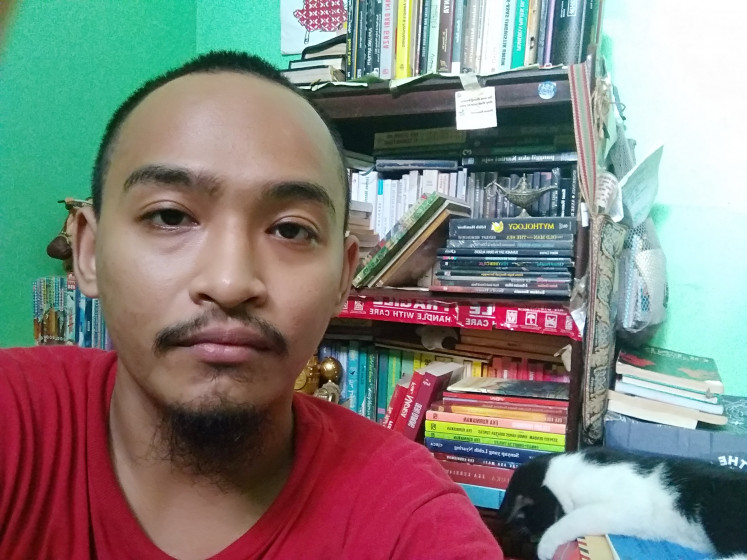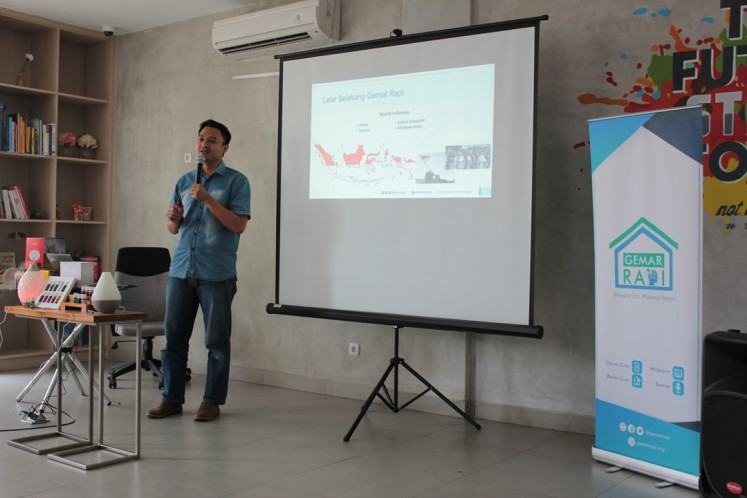Popular Reads
Top Results
Can't find what you're looking for?
View all search resultsPopular Reads
Top Results
Can't find what you're looking for?
View all search resultsRead it later, read it never: Indonesians who hoard books
Change text size
Gift Premium Articles
to Anyone
Some people have a habit of picking up books they will never read. It hasn’t stopped them from piling up their collection.
There is a term for the curious habit of piling up unread books. The Japanese call it "tsundoku", which the BBC defines as "the art of buying books and never reading them". People with this habit justify their excess purchase in various manners, but their excuses notwithstanding, they usually insist that "they'll get to read it later" — perhaps. In short, they are book hoarders.
"I left around 15 books mid-way and left around seven untouched," said Arthur Andre, not his real name, a 29-year-old programmer from Malang. "Mostly because I don't have the time. Sometimes work stands in the way and even when I do want to read, I can't focus on one book for a long time."
The term "tsundoku" is said to be born around the Meiji era (1868–1912). It is a portmanteau of the word "tsunde-oku", which means to pile things up ready for later and "dokusho", which means reading books. Although the term is indeed Japanese, Aang Hudaya, cofounder of the organization Gemar Rapi (Likes Tidiness), who has lived in Japan for more than five years, said the habit was not prevalent in the nation.
"In Japan, most people are very disciplined with everything. Including in terms of neatness and tidying up," said Aang. "Most of our Japanese circle of friends are very neat, and we rarely meet book hoarders. There may be, but there are very few of them, and we didn't happen to find them."
Not hoarders, just procrastinators
Tsundoku is different from bibliomania. One apparent distinction would be while a bibliomaniac would buy any book, people with tsundoku would only purchase the books they would like to read — the emphasis being on "would like".
"[I collect] mostly fiction, self-improvement and books related to my work in computer science," said Arthur." The last book I bought was Homo Deus by Yuval Noah Harari. [I bought it on Kindle] last month and still haven't read it. The last book I read was Maybe You Should Talk To Someone by Lori Gottlieb. I haven't finished that one either."
Dwiki Sayoga Putra, who prefers to be called Yota, currently owns 223 books, 20 comics and seven textbooks for his studies at the Muhammadiyah University of Sidoarjo. This number excludes the dictionaries.
Inheritance: Yota's parents also tend to have the habit of keeping books they don't read. (Courtesy of Dwiki Sayoga Putra) (Book readers, hoarding/Courtesy of Dwiki Sayoga Putra)
"Honestly I never really count how many I haven't read," said the education major. "The books I collect are mostly novels and poetry. There is no specific genre. I like all genres of fiction, except mysteries and thrillers. My favorite authors are Dea Anugrah and Eka Kurniawan.”
Yota has a myriad of reasons when it comes to why he hasn't touched some of his collection. "Sometimes I'm too tired to decide which book to read first. Some I don't touch because I see spoilers on social media. There are also books that I bought as collectibles, so I already have other copies of them."
Plus, "I have my studies and work, so my remaining spare time is more often spent sleeping or watching," said the 26-year-old diner part-timer.
For Kirara Tiara, not her real name, who also cited spoilers as one of the reasons why she'd drop a book, movie adaptations can also ruin the fun of a particular book. "Usually, if the story doesn't interest me from the start, over time, I'd just drop it. For example, the book Five Feet Apart. I watched the movie and hoped the book was as good, but it was far from what I expected. The novel feels boring."
"It's the opposite with John Green's The Fault in Our Stars. The book is good, but the movie adaptation is not up to scratch," said the 21-year-old psychology student.
To some degree, expectations certainly influence the reading mood for Kirara, but it doesn't always mean she would drop the book entirely. "The last time I set a reading target was to read Harry Potter. I finished it in just a few days. For other books I would only read them when I could if the book was good."
The problem is, Kirara is still living in her parents' house in East Jakarta. "My parents complained that my books take too much space. As a result, now everything is put in some containers, and I rarely reread anything, except when I'm in the mood," she said. "According to them, books are a waste of space and money. So they banned me from buying any more novels."
It's the other way around for Ziggy Zeirckaellaeisezabrizkie, whose father is the one with tsundoku. "My dad fits pretty well into this category. He would buy six new books when he still has five unread. Some are [eventually] read, while others are left collecting dust with the seals intact. Sometimes he'd buy duplicates, but more often than not, he doesn't realize it — usually because there's a new edition with a new cover."
The 29-year-old land titles registrar from Bandar Lampung also reveals another thing about living with people with tsundoku. "The house looks cluttered all the time. Actually, we do have a special room for books, because everyone in my family likes to read books, but it's on the third floor. Usually, they are too lazy to go upstairs, so everything piles up on the bottom floor," she sighed.
Decluttering the piles
Luckily for Arthur, who lives independently with his younger brother, nobody is making a fuss about his collection, especially since it is not physically visible — at least most of them.
"No one complains because I mostly buy e-books, so it is invisible. The prices vary, some [hardcovers] can cost up to Rp 900,000 [US$63,83], but on average they cost just around Rp 200,000 [$14.18]. Most of them are foreign books," he explained. "But sometimes I would buy physical books that have interesting covers."
Kirara decided to resign herself to the situation and began to read her unfinished collection. "I understand what [my parents] mean, and I also think it is very wasteful and impulsive."
Yota has his way of convincing his parents. "At first, my mother protested. But I explained that the books I own are partly gifts and giveaways prizes, [or bought with] the proceeds from selling books. Sometimes I would help a friend to sell books — other times, I sell my own."
It turned out that it didn't take much to convince his parents, as they are also avid collectors in their own right. "Mom and Dad also like [to collect books]. Mostly religious books, but they are seldom read. Maybe I caught the habit from them," he mused.
Aang, who founded Gemar Rapi on Sept. 5, 2018, with several of his acquaintances, often helps families sort and organize their homes using a concept that combines Japanese-style Konmari, Swedish-style Lagom and Danish-style Hygge.
Native but not much: According to Aang, it is rare for the Japanese to pile up things due to their discipline nature. (Courtesy of Gemar Rapi) (Personal collection/Courtesy of Gemar Rapi)
"Make sure what the purpose of buying the book is. Make your own criteria of necessities, start decluttering. Give deadlines for books that you doubt will ever finish or the ones you want to drop," he advised.
"Usually people hoard because there is an [underlying reason] behind it, [for example] they used to be unable to afford the books, so now they become impulsive. There is also this stigma that discarding books means eliminating knowledge. But one can hardly claim that when the books are not even read to begin with."
ohmg












